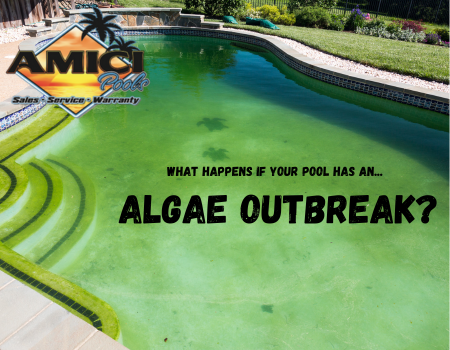Imagine diving into your refreshing pool on a hot summer day, only to be greeted by a murky green landscape. An algae outbreak can transform your beautiful pool into a frustrating eyesore.
 Different Types of Algae
Different Types of Algae
Algae are microscopic aquatic organisms that thrive in water under certain conditions. While some algae are beneficial in natural ecosystems, in a pool, they become unwelcome guests. Here’s a breakdown of the common types of algae that can plague your pool:
- Green Algae: The most common culprit behind a cloudy, pea-soup green pool. Green algae thrives in warm, stagnant water where there are high nutrient levels.
- Black Algae: This stubborn variety forms black or brown patches or streaks on pool walls and floors. It’s more resistant to chlorine and often takes a more targeted approach for removal.
- Yellow Algae: Also known as mustard algae, it appears as yellow or brown dust or film on pool surfaces. It’s typically less common but can be quite persistent.
What Causes Algae Outbreaks?
There are different reasons why algae can grow in pools, and they include:
- Imbalanced Pool Chemistry: Inadequate pH levels or insufficient chlorine can create a conducive environment that will encourage the growth of algae.
- Lack of Circulation: Stagnant water allows algae spores to settle and multiply. Make sure your pool pump operates for enough hours daily to uphold proper circulation.
- Debris and Contaminants: Leaves, dirt, and other organic debris provide nutrients that feed algae growth. Regularly skim your pool and maintain a clean pool environment.
- Excessive Sunlight: Algae thrive in sunlight. Consider shade options for part of your pool, especially in hot climates.
- Hot Weather: Warm water temperatures accelerate algae growth. During hot weather, be extra vigilant about maintaining proper pool chemistry and cleaning routines.
The Impact of Algae Outbreaks
Beyond the unpleasant aesthetics, algae outbreaks can have several negative consequences:
- Reduced Water Clarity: Algae clouds your pool water, making it difficult to see and hindering the effectiveness of chlorine.
- Skin and Eye Irritation: Swimmers might experience itchy skin, red eyes, and respiratory irritation due to algae and its byproducts.
- Clogged Filters: Algae can clog your pool filter, reducing its efficiency and requiring more frequent cleaning.
- Stained Pool Surfaces: Certain algae types, like black algae, can stain pool surfaces if left untreated.
Taking Action: How to Eliminate Algae
If you discover an algae outbreak in your pool, don’t panic! Here’s a step-by-step approach to eliminating it:
- Identify the Algae Type: Understanding the specific type of algae helps you choose the most effective treatment approach.
- Shock Your Pool: A chlorine shock treatment raises chlorine levels rapidly to kill existing algae. Follow the instructions on your chosen shock product carefully.
- Balance Your Pool Chemistry: Test and adjust your pool’s pH and chlorine levels to ensure they are within the ideal range. Properly balanced water helps prevent future outbreaks.
- Brush and Vacuum: Brushing pool walls and surfaces helps loosen algae spores, making them easier to remove by your pool vacuum.
- Run Your Pool Pump: Ensure your pool pump runs for extended periods (ideally 8-12 hours per day) to maintain proper circulation and distribute chlorine effectively.
- Consider Algaecide: In some cases, using an algaecide specifically formulated for your identified algae type can provide an extra boost to eliminate stubborn algae growth.
Preventing Future Outbreaks: Keeping Your Pool Algae-Free
Prevention is always better than cure. Here are some tips to help keep algae away:
- Maintain Consistent Pool Maintenance: Regular skimming, cleaning, and testing your pool chemistry are crucial.
- Maintain Proper Chlorine Levels: Consistent chlorine levels are vital for preventing algae growth. Shock your pool periodically as needed.
- Cover Your Pool When Not in Use: A pool cover helps minimize debris and sunlight exposure, both of which contribute to algae growth.
- Invest in a Pool Cover: A solar pool cover can not only prevent algae growth but also help retain heat and reduce pool chemical evaporation.
Algae outbreaks can be a nuisance, but with proper knowledge and a proactive approach, you can effectively combat them and prevent future occurrences. By maintaining a clean pool environment, balanced water chemistry, and consistent circulation, you can keep your pool sparkling blue and algae-free all season long.
